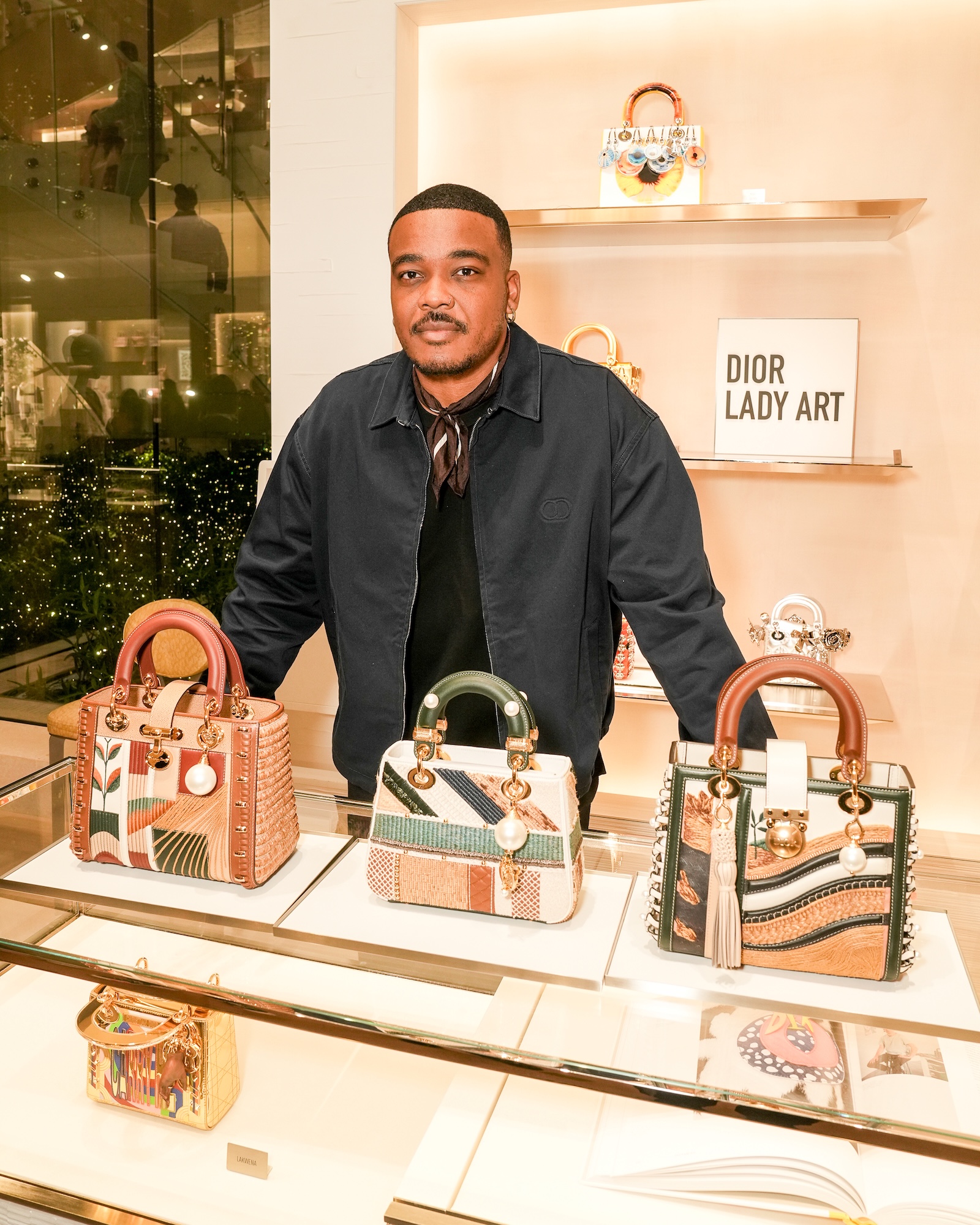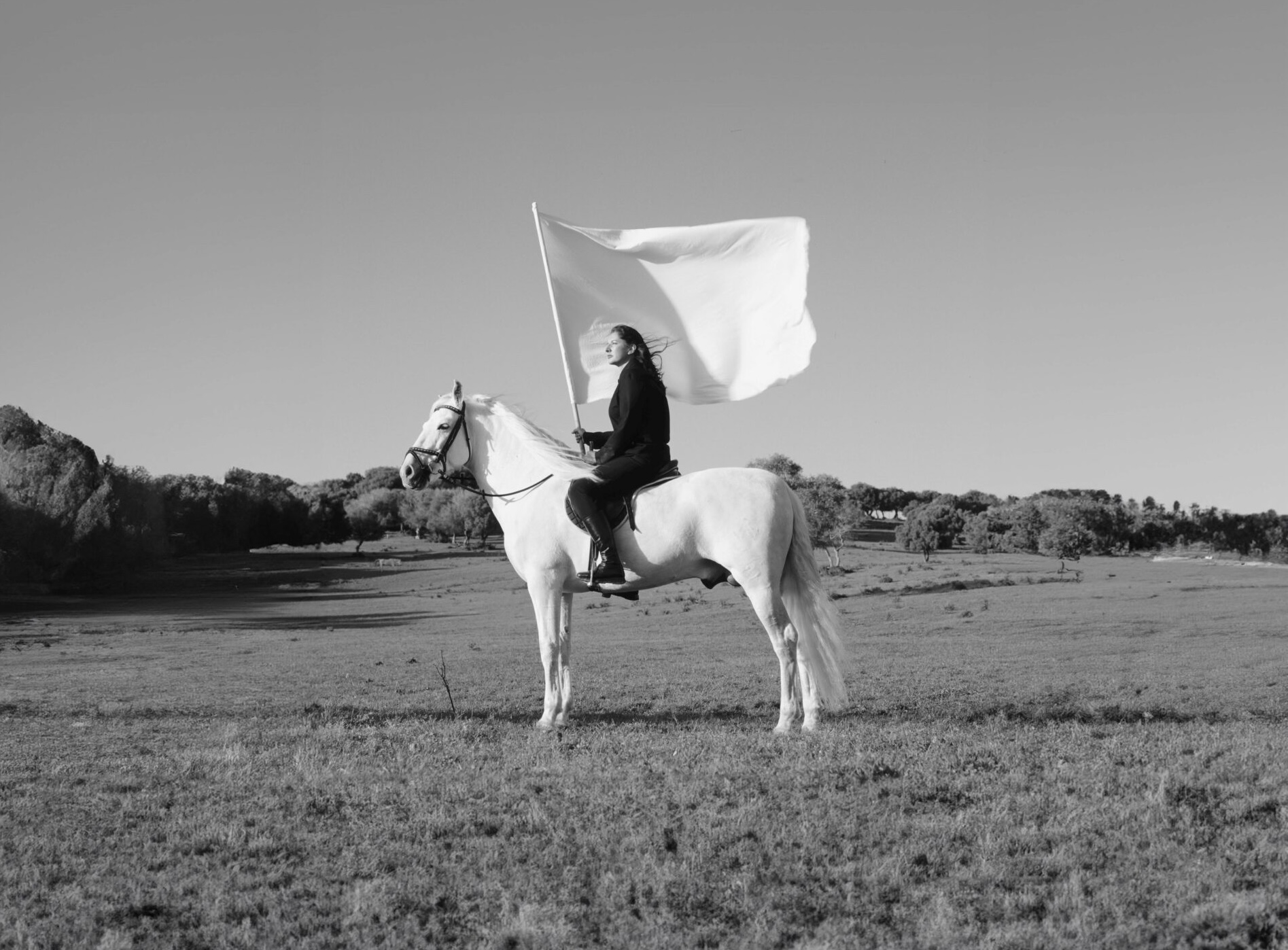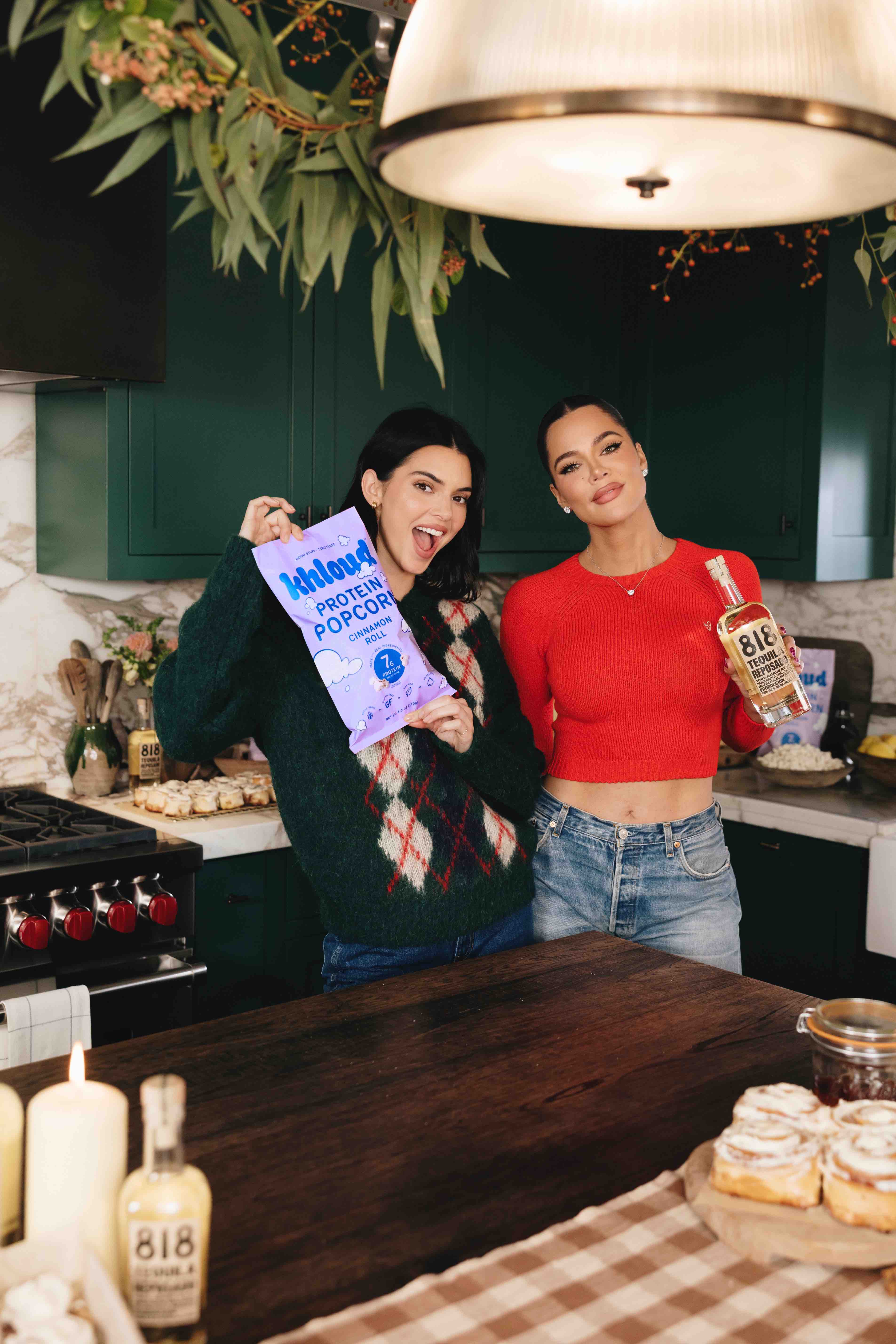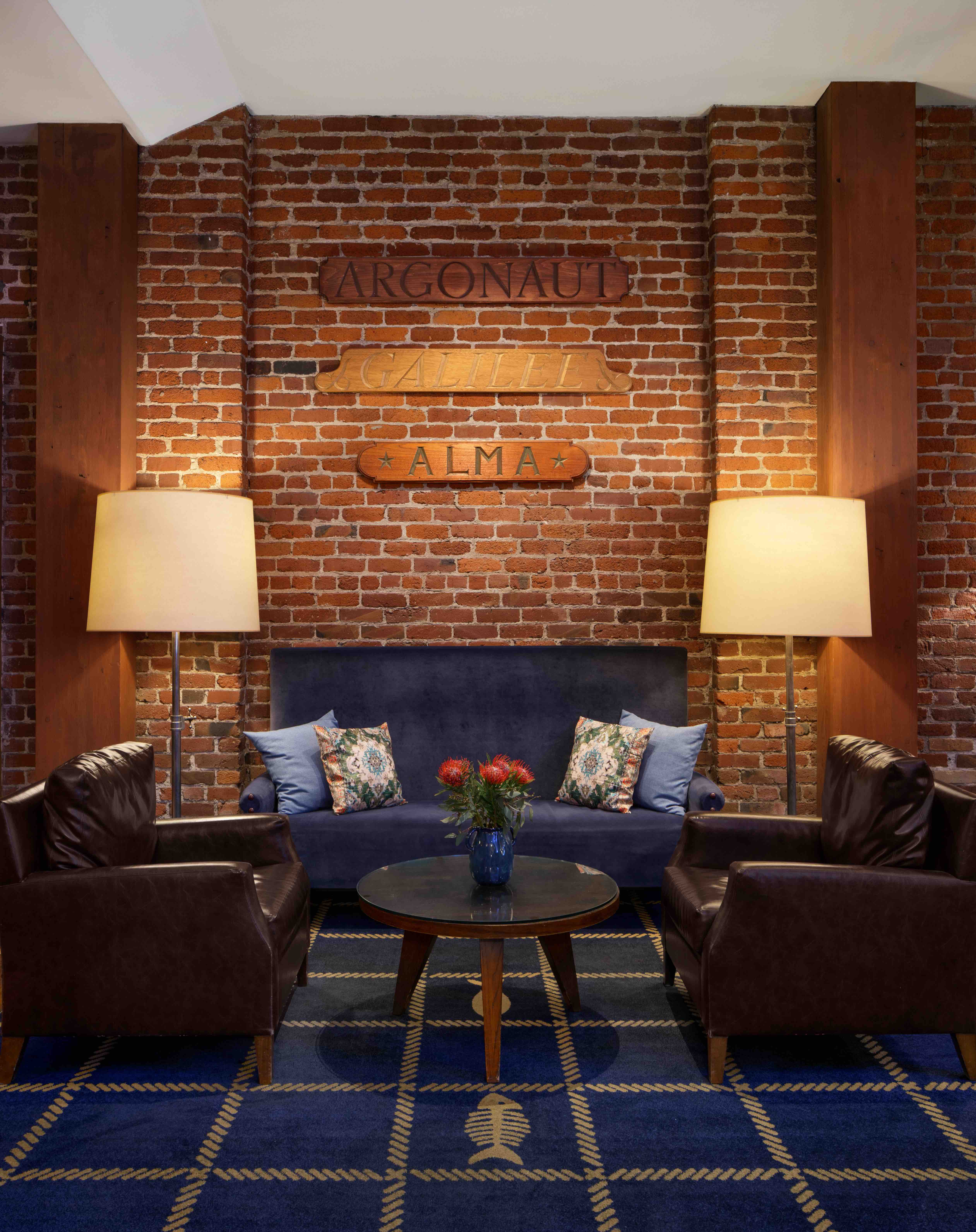

Photographed by Sharon Marrero.
Born and raised in Inglewood, California, D Smoke personifies his city with charm and pride. They call it the “City of Champions” and Smoke has been no exception.
Birth name Daniel Farris, Smok'e’s life has been centered around beats and rhymes. Coming from a family of musicians and talented gospel singers, it was only right for him to find his place within the rankings. For years he’s worked behind the scenes writing hits and sharpening his skill. That all came to the forefront in 2019 after winning Netflix’s first hip hop contest show, Rhythm + Flow judged by T.I., Cardi B and Chance the Rapper. Before taking the title home, he shined each episode with raw lyrics, exceptional artistry and pure authenticity.
February 7, 2020, Smoke dropped his second studio album “Black Habits”, an ode to his Black history so he says. Full of soulful sounds and deep cutting lyrics Smoke never once veered off from the lasting impressions he gave the world while on TV. The album features legends like Snoop Dogg and Jill Scott and those rising like Ari Lennox and his baby brother SiR; seamlessly ties together moments of his life into 16 songs. To some, this was an introduction to Smoke’s creativity and in-depth thought process; for others, it’s a continuation of stories and experiences all too reminiscent of their own.
Now as he settles into the mainstream realm, he’s keeping tight to his family, his heart and Inglewood.
**So last year you won the Netflix contest, how has life changed since then? I feel like you've been talking about this for the past year, but it made a dramatic shift in your career and everything. How has life been since that transition?**
Life has been busy, to say the least. I've done a lot traveling recently, both to connect with, you know, partners, people that we’re collaborating with either on touring or making new music. Then also to do shows in different places. So there's been a lot of opportunities opening up and of course, a lot of the fans are really excited about the moment that I had on Rhythm + Flow, so you know, everywhere we touch down, you know, somebody is recognizing me now and now we're taking a lot of pictures.
**How does it feel now to know that people want to meet you, people want to talk to you, they want to see you and they know who you are?**
It's lovely. You know, the beauty about Rhythm + Flow is that they did a good job telling the story. So people when they see me it's not just because I had a hot single or their kid does you know Triller videos to my song. This is also because you know they connect with the story and they connect with what I stand for. Not to knock Triller videos it’s fun, you know what I’m saying? But just to say that people are connecting for real, you know, for reasons other than they like my music.
**Describing your story - what was it like for you growing up like in Inglewood?**
Growing up in Inglewood, it's a little bit like double-sided you know. It's beautiful, there's a lot of families. Inglewood is a small city so it has its own charm, you know. But at the same time, it’s the Inglewood that people know it for. You will get stopped and you will get checked you know. Somebody will ask, ‘Where you coming from’ or ‘Where you headed’ or ‘Who you know.’ So the combination of both those and that's similar to my family you know, there is like a lot of love, a lot of, you know, music, musical upbringing, exposure to just artistry at a high level. But then there's also the history of drugs and incarceration. So both Inglewood and my family share that duality, you know; conflict and beauty of love.
**What is one thing you take from your childhood that you still carry with you today? Having consistently lived in that state of conflict, but it's like love and war. How has that shaped you to be who you are today, as an artist as well?**
I think it just makes me, I'm trying to skip over the words “wiser” and “stronger,” but those are the ones that come to mind. It gives me a different type of strength. Both from being exposed but also being given the tools to navigate a complex area.
**Do you feel like you have an old soul?**
Absolutely. I definitely have an old soul.
**Your little brother’s career popped off a little bit before yours and with that happening, you guys growing up the same way. From the sound, you guys both have very soulful sounds but obviously, he went to more R&B and you're going a more hip hop way, but it still is the perfect combination. What was it like for you as an older brother watching him reach his success? And then knowing that yours was coming next, even if you didn't know, what was it like?**
I mean I was proud. My goal has always been to see the people around me succeed. That was my reason for starting music, not to be a famous artist, it was to feed families, it was to feed music. And I have to correct you one of the things they said, ‘He popped off first and then I went,’ when I was 19 I had singles on the radio that I was writing for other people. He was working at a gym and at that time, I kind of pulled him in like, ‘Bro, you're gifted you shouldn’t be doing this,’ you know? So it was always me trying to see him succeed and not to attach myself to it, but just because I wanted that for my brother. And so of course when that happened, it had nothing to do with what I wanted for myself. I was okay, I wasn’t starving, I was teaching, my bills was paid and I was celebrating my brother's success. And, not just celebrating it, I was concerned with his well being and how well he was handling that amount of exposure and things like that. It really just being a true support not for the artists but for my brother Darryl.
**Hearing that story, you were being more so a good big brother. Were you worried about him in any way? Like you said, you guys were fine, so was it like, ‘let's do this for our family’ or ‘let's get him out of the streets or anything.’ Outside of his own wellbeing, was it just the love of music, what did you say to him?**
Well, it was really he came to the studio. We had a writing camp of like five people that we use always have at the studios and he sang a song idea to a beat that we had been planning. You know as kids we all hear music, but Sir, he just was like, ‘man, I don't want to do this,’ as a kid. Then as an adult, he came back around and then he sang the song idea snd I was like, ‘bro, you’re something else.’ So I gave him a computer and a mic and then that year, he recorded like 150 songs on his own, you know, because he knew how to engineer, he learned from us and then went to school for it.
**You’re a great role model then because look at both of you now, it's completely paid off. From one person having a vision of something that most people wouldn't go after. So since we're talking about the recording process, what was the process for creating your last album “Black Habits?” How did it differ from the previous work before winning the Netflix show?**
A lot of “Black Habits” was recorded before the Netflix show. So you’re getting a look into the energy that was building up prior to. And so the depths of my artistry that people appreciated on the show was kind of a continuation was what I had already been working on. Then after the show what kind of completed “Black Habits” was me knowing what sides of me the world was about to see on the show and wanting to complete that story. So we added a couple bangers I know after, stuff like “No Commas” and “Gaspar Yanga,” those came after. So did you know moments like, “Real Body” with Ari Lennox, that came after. But you know, we already had “Closer to God,” “Sunkissed Child.” We had “Top of the Morning, we had “Bullies,” we had “Black Habits II”, you know, “Like My Daddy.” All the storyline songs we had already kind of brought together but as well as the intro and interludes and everything. We knew how we wanted it to flow. We just added some moments based on, you know, the energy that we felt like we needed in that project.
**What was your favorite song on the album?**
My favorite song still has to be “Sunkissed Child” I think musically. You know, when DJ Battlecat played me that beat, I just kind of lost it. Like I love the chord progression and to be able to do something so West Coast but then so musical at the time. I was like, you know that that's the one I gotta get on and he blessed me with that beat you know, and that's him and Larrance from 1500.
**You speak a lot of Spanish on your album, I know you're fluent so how did you learn it? Where did that come from?**
Well, since I was 10 I always wanted to learn it. First class I took was at Inglewood High, and then I just continued at UCLA. Thought I was about to minor in Spanish, ended up switching my major and then I majored in Spanish. The year before my fourth year at UCLA I traveled abroad, I went to Costa Rica for the summer. And so, you know, that just kind of solidified how much I was already learning in class to be in that environment. And you know, even before then I treated LA like I was already in an immersion program. You know, there's enough people in LA where you could speak Spanish all day if you wanted to. There's enough radio stations, television stations, you can kind of convert your whole life to that. I did that, during that period when I was learning Spanish.
**When you look back at your life what do you think of the opportunities that you've had traveling abroad, going to UCLA? What kind of weight do those things hold on you?**
Experiences are everything. I believe exposure is everything. When I went to Costa Rica it was not a convenient time at all, you know, It was in the middle of us recently having been signed to a publisher, like in the studio writing songs for major artists and stuff. I actually got some kickback from my team, my older brother, and even the management at that time was like bro this is not the time for you to be out the country for a couple months. And I was like, yeah, but it’s the only time for me to be out the country. That's actually still true, I haven’t left the country for that amount of time since. I knew I was making a sacrifice to give myself that experience and I don't regret it at all. I still have those yields, you know, when it is necessary. Investment sometimes isn't convenient, you know, but it's necessary. You got to make those choices, take those opportunity costs, you know, chalk it up to the game and do what's best.
**Do you have any sacrifices that you've made that you turned around and was like, ‘Man, I shouldn't,’ as far as sacrifices go because we all have to make a sacrifice at some point to get somewhere?**
I mean, in the short term, yes. You know, I might like when I came back from Costa Rica, I was like, ‘dang, what did I miss?’ you know. Or when I went to college, I was acting all through high school and I was booking. My management at that time was like ‘Look, man, you know, I don't mean to tell you don't go to college but you keep auditioning’ and they sending me out, but it was conflicting with my studies. I was like ‘Look, man, I'm gonna go ahead and go to school.’ So in a short term, you know, in my mid-20s when I'm not acting and I'm teaching and money is tight, of course, I look like ‘Man I could have been on movies, I could have been Will Smith status by now,’ but of course, in the long run, everything happens for a reason. So I try not to allow myself to regret things that when I make the decision that you know, my heart tells me are best and that was the case both times when I chose to stop going out on auditions and when I chose to study abroad. Both have changed my life.
**Was Rhythm + Flow the last audition that you’ve done technically.**
Yes, yeah.
**That’s cool, literally everything came full circle.**
Absolutely.
**Do you credit your acting skills and your history as far as your family being musical as something that helps you become a better artist? Do you ever feel like those things intertwine?**
I credit my acting my experience to the role that I played in creating the music videos, creating treatments and coming up with concepts and seeing the whole process together. When you're doing videos as an independent artist, you don't have the advantage of bringing on a producer a lot of times so you got to be so involved in all of the processes so that it can come together. So having done acting in high school, and had played these roles, I think it informs my artistry definitely. Not so much on stage but really when it comes to the music videos and whatnot.
**It sounds like your life has been ordained and aligned from the start, it’s beautiful to hear. I’m happy for you!**
Me too! I couldn’t agree more.
**Alright, so another reason to celebrate. I celebrate Black people every day, but for the purposes of the world, what has been your most proud moment of Black History Month this year? What are you excited for as far as Black people, Black history and yourself, what are you most proud of?**
Man, that’s a loaded question. I don’t know, I'm proud to see my family together you know. I'm proud to see my parents, they remarried for a third time. Well recently for a second time, they've gotten married for the third time. And, you know, just to see them go through things and come back together and celebrate their sons this way. We always think of Black history on a large scale, whereas our individual history is what’s most important to us. So that's what actually, really kind of makes me happy. I think my family is Black history.
**Absolutely and you’re technically writing the story for them.**
Man!

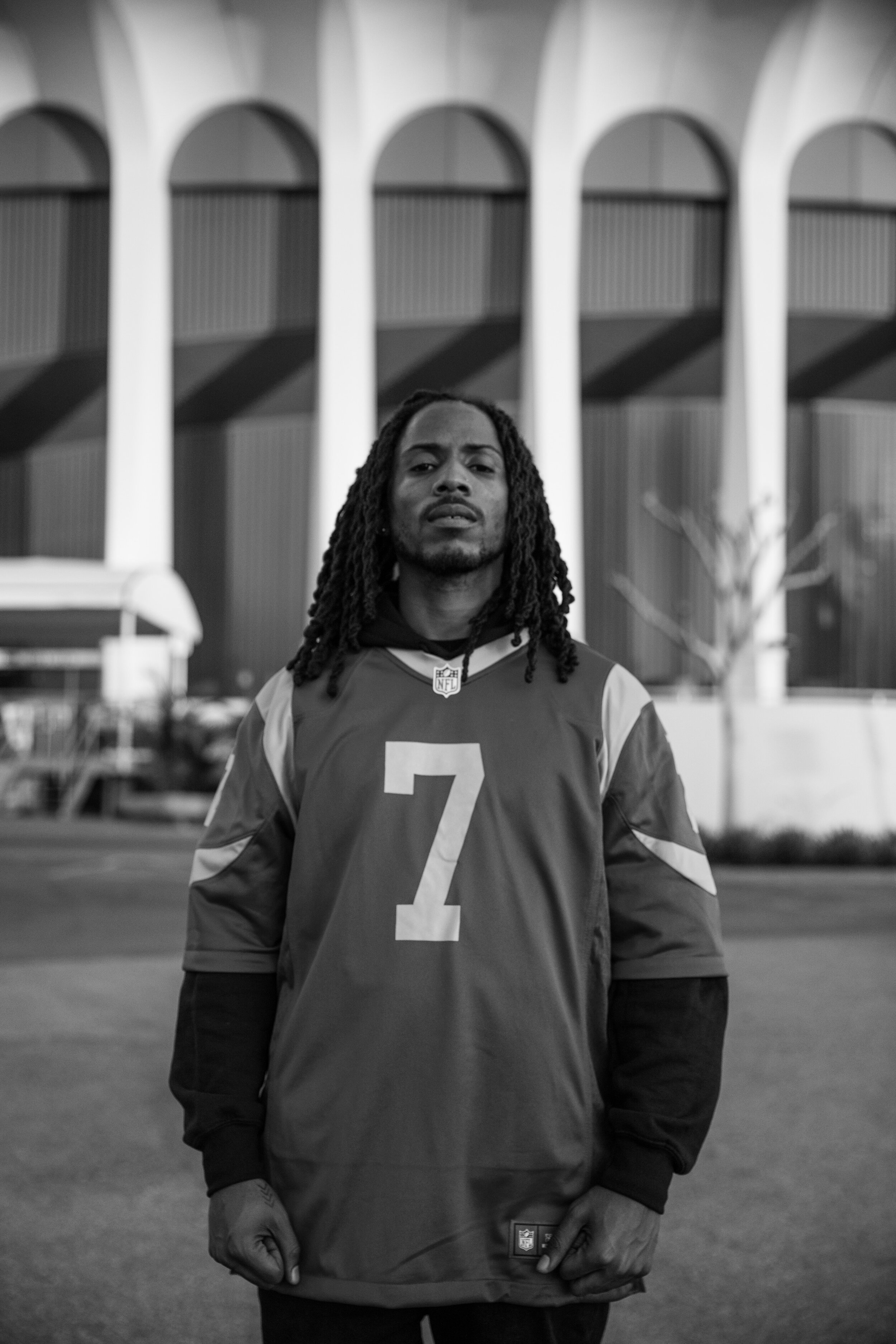
Photographed by Pico Shaw.
**How have you been celebrating your own Blackness overall?**
I celebrate Blackness by eating fried catfish breakfast once a week at Rusty Pot Cafe in Inglewood. A Black-owned restaurant.
**I literally just had Rusty Pot on Sunday!**
It’s so good! In addition to that, I think my entire project and what I'm doing creatively is like it's an ode to not only my family story but to Blackness. I think it's a perfect way to start as to not confuse what I’m doing with incorporating Spanish, you know or all that I do kind of trying to represent Inglewood you know. I don't want my pride that I have for my experience as a Black man to get lost amongst those other things, so I think the project is an ode to my very Black upbringing.
**I'm not even from here, but I do live in Inglewood. I'm happy that you are still here, still living your life as though you. Very humble. With that said, what do you foresee your future as? If you could plan your future, see your future, what do you want?**
I envision expansion, you know, in a sense of creatively people seeing the different facets of my creative mind. From literature to film and television and more music to begin. you know, but I look forward to expanding and business endeavors as well. So, I had the advantage of having real-life experience prior to going into the music industry or you know, the public eye. I've had a lot of time envisioning what this will look like. So we're going to continue to curate these experiences for our audience through the music, then through literature, then through film and television. Then ultimately business endeavors that align with what people are already seeing in the music and the videos.
**That sounds very thought through. You know, music touches people, but then it also other ways to touch people and so we got to put all 10 toes into everything.**
PERIOD!
 
Photographed by Sharon Marrero.
Born and raised in Inglewood, California, D Smoke personifies his city with charm and pride. They call it the “City of Champions” and Smoke has been no exception.
Birth name Daniel Farris, Smok'e’s life has been centered around beats and rhymes. Coming from a family of musicians and talented gospel singers, it was only right for him to find his place within the rankings. For years he’s worked behind the scenes writing hits and sharpening his skill. That all came to the forefront in 2019 after winning Netflix’s first hip hop contest show, Rhythm + Flow judged by T.I., Cardi B and Chance the Rapper. Before taking the title home, he shined each episode with raw lyrics, exceptional artistry and pure authenticity.
February 7, 2020, Smoke dropped his second studio album “Black Habits”, an ode to his Black history so he says. Full of soulful sounds and deep cutting lyrics Smoke never once veered off from the lasting impressions he gave the world while on TV. The album features legends like Snoop Dogg and Jill Scott and those rising like Ari Lennox and his baby brother SiR; seamlessly ties together moments of his life into 16 songs. To some, this was an introduction to Smoke’s creativity and in-depth thought process; for others, it’s a continuation of stories and experiences all too reminiscent of their own.
Now as he settles into the mainstream realm, he’s keeping tight to his family, his heart and Inglewood.
**So last year you won the Netflix contest, how has life changed since then? I feel like you've been talking about this for the past year, but it made a dramatic shift in your career and everything. How has life been since that transition?**
Life has been busy, to say the least. I've done a lot traveling recently, both to connect with, you know, partners, people that we’re collaborating with either on touring or making new music. Then also to do shows in different places. So there's been a lot of opportunities opening up and of course, a lot of the fans are really excited about the moment that I had on Rhythm + Flow, so you know, everywhere we touch down, you know, somebody is recognizing me now and now we're taking a lot of pictures.
**How does it feel now to know that people want to meet you, people want to talk to you, they want to see you and they know who you are?**
It's lovely. You know, the beauty about Rhythm + Flow is that they did a good job telling the story. So people when they see me it's not just because I had a hot single or their kid does you know Triller videos to my song. This is also because you know they connect with the story and they connect with what I stand for. Not to knock Triller videos it’s fun, you know what I’m saying? But just to say that people are connecting for real, you know, for reasons other than they like my music.
**Describing your story - what was it like for you growing up like in Inglewood?**
Growing up in Inglewood, it's a little bit like double-sided you know. It's beautiful, there's a lot of families. Inglewood is a small city so it has its own charm, you know. But at the same time, it’s the Inglewood that people know it for. You will get stopped and you will get checked you know. Somebody will ask, ‘Where you coming from’ or ‘Where you headed’ or ‘Who you know.’ So the combination of both those and that's similar to my family you know, there is like a lot of love, a lot of, you know, music, musical upbringing, exposure to just artistry at a high level. But then there's also the history of drugs and incarceration. So both Inglewood and my family share that duality, you know; conflict and beauty of love.
**What is one thing you take from your childhood that you still carry with you today? Having consistently lived in that state of conflict, but it's like love and war. How has that shaped you to be who you are today, as an artist as well?**
I think it just makes me, I'm trying to skip over the words “wiser” and “stronger,” but those are the ones that come to mind. It gives me a different type of strength. Both from being exposed but also being given the tools to navigate a complex area.
**Do you feel like you have an old soul?**
Absolutely. I definitely have an old soul.
**Your little brother’s career popped off a little bit before yours and with that happening, you guys growing up the same way. From the sound, you guys both have very soulful sounds but obviously, he went to more R&B and you're going a more hip hop way, but it still is the perfect combination. What was it like for you as an older brother watching him reach his success? And then knowing that yours was coming next, even if you didn't know, what was it like?**
I mean I was proud. My goal has always been to see the people around me succeed. That was my reason for starting music, not to be a famous artist, it was to feed families, it was to feed music. And I have to correct you one of the things they said, ‘He popped off first and then I went,’ when I was 19 I had singles on the radio that I was writing for other people. He was working at a gym and at that time, I kind of pulled him in like, ‘Bro, you're gifted you shouldn’t be doing this,’ you know? So it was always me trying to see him succeed and not to attach myself to it, but just because I wanted that for my brother. And so of course when that happened, it had nothing to do with what I wanted for myself. I was okay, I wasn’t starving, I was teaching, my bills was paid and I was celebrating my brother's success. And, not just celebrating it, I was concerned with his well being and how well he was handling that amount of exposure and things like that. It really just being a true support not for the artists but for my brother Darryl.
**Hearing that story, you were being more so a good big brother. Were you worried about him in any way? Like you said, you guys were fine, so was it like, ‘let's do this for our family’ or ‘let's get him out of the streets or anything.’ Outside of his own wellbeing, was it just the love of music, what did you say to him?**
Well, it was really he came to the studio. We had a writing camp of like five people that we use always have at the studios and he sang a song idea to a beat that we had been planning. You know as kids we all hear music, but Sir, he just was like, ‘man, I don't want to do this,’ as a kid. Then as an adult, he came back around and then he sang the song idea snd I was like, ‘bro, you’re something else.’ So I gave him a computer and a mic and then that year, he recorded like 150 songs on his own, you know, because he knew how to engineer, he learned from us and then went to school for it.
**You’re a great role model then because look at both of you now, it's completely paid off. From one person having a vision of something that most people wouldn't go after. So since we're talking about the recording process, what was the process for creating your last album “Black Habits?” How did it differ from the previous work before winning the Netflix show?**
A lot of “Black Habits” was recorded before the Netflix show. So you’re getting a look into the energy that was building up prior to. And so the depths of my artistry that people appreciated on the show was kind of a continuation was what I had already been working on. Then after the show what kind of completed “Black Habits” was me knowing what sides of me the world was about to see on the show and wanting to complete that story. So we added a couple bangers I know after, stuff like “No Commas” and “Gaspar Yanga,” those came after. So did you know moments like, “Real Body” with Ari Lennox, that came after. But you know, we already had “Closer to God,” “Sunkissed Child.” We had “Top of the Morning, we had “Bullies,” we had “Black Habits II”, you know, “Like My Daddy.” All the storyline songs we had already kind of brought together but as well as the intro and interludes and everything. We knew how we wanted it to flow. We just added some moments based on, you know, the energy that we felt like we needed in that project.
**What was your favorite song on the album?**
My favorite song still has to be “Sunkissed Child” I think musically. You know, when DJ Battlecat played me that beat, I just kind of lost it. Like I love the chord progression and to be able to do something so West Coast but then so musical at the time. I was like, you know that that's the one I gotta get on and he blessed me with that beat you know, and that's him and Larrance from 1500.
**You speak a lot of Spanish on your album, I know you're fluent so how did you learn it? Where did that come from?**
Well, since I was 10 I always wanted to learn it. First class I took was at Inglewood High, and then I just continued at UCLA. Thought I was about to minor in Spanish, ended up switching my major and then I majored in Spanish. The year before my fourth year at UCLA I traveled abroad, I went to Costa Rica for the summer. And so, you know, that just kind of solidified how much I was already learning in class to be in that environment. And you know, even before then I treated LA like I was already in an immersion program. You know, there's enough people in LA where you could speak Spanish all day if you wanted to. There's enough radio stations, television stations, you can kind of convert your whole life to that. I did that, during that period when I was learning Spanish.
**When you look back at your life what do you think of the opportunities that you've had traveling abroad, going to UCLA? What kind of weight do those things hold on you?**
Experiences are everything. I believe exposure is everything. When I went to Costa Rica it was not a convenient time at all, you know, It was in the middle of us recently having been signed to a publisher, like in the studio writing songs for major artists and stuff. I actually got some kickback from my team, my older brother, and even the management at that time was like bro this is not the time for you to be out the country for a couple months. And I was like, yeah, but it’s the only time for me to be out the country. That's actually still true, I haven’t left the country for that amount of time since. I knew I was making a sacrifice to give myself that experience and I don't regret it at all. I still have those yields, you know, when it is necessary. Investment sometimes isn't convenient, you know, but it's necessary. You got to make those choices, take those opportunity costs, you know, chalk it up to the game and do what's best.
**Do you have any sacrifices that you've made that you turned around and was like, ‘Man, I shouldn't,’ as far as sacrifices go because we all have to make a sacrifice at some point to get somewhere?**
I mean, in the short term, yes. You know, I might like when I came back from Costa Rica, I was like, ‘dang, what did I miss?’ you know. Or when I went to college, I was acting all through high school and I was booking. My management at that time was like ‘Look, man, you know, I don't mean to tell you don't go to college but you keep auditioning’ and they sending me out, but it was conflicting with my studies. I was like ‘Look, man, I'm gonna go ahead and go to school.’ So in a short term, you know, in my mid-20s when I'm not acting and I'm teaching and money is tight, of course, I look like ‘Man I could have been on movies, I could have been Will Smith status by now,’ but of course, in the long run, everything happens for a reason. So I try not to allow myself to regret things that when I make the decision that you know, my heart tells me are best and that was the case both times when I chose to stop going out on auditions and when I chose to study abroad. Both have changed my life.
**Was Rhythm + Flow the last audition that you’ve done technically.**
Yes, yeah.
**That’s cool, literally everything came full circle.**
Absolutely.
**Do you credit your acting skills and your history as far as your family being musical as something that helps you become a better artist? Do you ever feel like those things intertwine?**
I credit my acting my experience to the role that I played in creating the music videos, creating treatments and coming up with concepts and seeing the whole process together. When you're doing videos as an independent artist, you don't have the advantage of bringing on a producer a lot of times so you got to be so involved in all of the processes so that it can come together. So having done acting in high school, and had played these roles, I think it informs my artistry definitely. Not so much on stage but really when it comes to the music videos and whatnot.
**It sounds like your life has been ordained and aligned from the start, it’s beautiful to hear. I’m happy for you!**
Me too! I couldn’t agree more.
**Alright, so another reason to celebrate. I celebrate Black people every day, but for the purposes of the world, what has been your most proud moment of Black History Month this year? What are you excited for as far as Black people, Black history and yourself, what are you most proud of?**
Man, that’s a loaded question. I don’t know, I'm proud to see my family together you know. I'm proud to see my parents, they remarried for a third time. Well recently for a second time, they've gotten married for the third time. And, you know, just to see them go through things and come back together and celebrate their sons this way. We always think of Black history on a large scale, whereas our individual history is what’s most important to us. So that's what actually, really kind of makes me happy. I think my family is Black history.
**Absolutely and you’re technically writing the story for them.**
Man!

Photographed by Sharon Marrero.
Born and raised in Inglewood, California, D Smoke personifies his city with charm and pride. They call it the “City of Champions” and Smoke has been no exception.
Birth name Daniel Farris, Smok'e’s life has been centered around beats and rhymes. Coming from a family of musicians and talented gospel singers, it was only right for him to find his place within the rankings. For years he’s worked behind the scenes writing hits and sharpening his skill. That all came to the forefront in 2019 after winning Netflix’s first hip hop contest show, Rhythm + Flow judged by T.I., Cardi B and Chance the Rapper. Before taking the title home, he shined each episode with raw lyrics, exceptional artistry and pure authenticity.
February 7, 2020, Smoke dropped his second studio album “Black Habits”, an ode to his Black history so he says. Full of soulful sounds and deep cutting lyrics Smoke never once veered off from the lasting impressions he gave the world while on TV. The album features legends like Snoop Dogg and Jill Scott and those rising like Ari Lennox and his baby brother SiR; seamlessly ties together moments of his life into 16 songs. To some, this was an introduction to Smoke’s creativity and in-depth thought process; for others, it’s a continuation of stories and experiences all too reminiscent of their own.
Now as he settles into the mainstream realm, he’s keeping tight to his family, his heart and Inglewood.
**So last year you won the Netflix contest, how has life changed since then? I feel like you've been talking about this for the past year, but it made a dramatic shift in your career and everything. How has life been since that transition?**
Life has been busy, to say the least. I've done a lot traveling recently, both to connect with, you know, partners, people that we’re collaborating with either on touring or making new music. Then also to do shows in different places. So there's been a lot of opportunities opening up and of course, a lot of the fans are really excited about the moment that I had on Rhythm + Flow, so you know, everywhere we touch down, you know, somebody is recognizing me now and now we're taking a lot of pictures.
**How does it feel now to know that people want to meet you, people want to talk to you, they want to see you and they know who you are?**
It's lovely. You know, the beauty about Rhythm + Flow is that they did a good job telling the story. So people when they see me it's not just because I had a hot single or their kid does you know Triller videos to my song. This is also because you know they connect with the story and they connect with what I stand for. Not to knock Triller videos it’s fun, you know what I’m saying? But just to say that people are connecting for real, you know, for reasons other than they like my music.
**Describing your story - what was it like for you growing up like in Inglewood?**
Growing up in Inglewood, it's a little bit like double-sided you know. It's beautiful, there's a lot of families. Inglewood is a small city so it has its own charm, you know. But at the same time, it’s the Inglewood that people know it for. You will get stopped and you will get checked you know. Somebody will ask, ‘Where you coming from’ or ‘Where you headed’ or ‘Who you know.’ So the combination of both those and that's similar to my family you know, there is like a lot of love, a lot of, you know, music, musical upbringing, exposure to just artistry at a high level. But then there's also the history of drugs and incarceration. So both Inglewood and my family share that duality, you know; conflict and beauty of love.
**What is one thing you take from your childhood that you still carry with you today? Having consistently lived in that state of conflict, but it's like love and war. How has that shaped you to be who you are today, as an artist as well?**
I think it just makes me, I'm trying to skip over the words “wiser” and “stronger,” but those are the ones that come to mind. It gives me a different type of strength. Both from being exposed but also being given the tools to navigate a complex area.
**Do you feel like you have an old soul?**
Absolutely. I definitely have an old soul.
**Your little brother’s career popped off a little bit before yours and with that happening, you guys growing up the same way. From the sound, you guys both have very soulful sounds but obviously, he went to more R&B and you're going a more hip hop way, but it still is the perfect combination. What was it like for you as an older brother watching him reach his success? And then knowing that yours was coming next, even if you didn't know, what was it like?**
I mean I was proud. My goal has always been to see the people around me succeed. That was my reason for starting music, not to be a famous artist, it was to feed families, it was to feed music. And I have to correct you one of the things they said, ‘He popped off first and then I went,’ when I was 19 I had singles on the radio that I was writing for other people. He was working at a gym and at that time, I kind of pulled him in like, ‘Bro, you're gifted you shouldn’t be doing this,’ you know? So it was always me trying to see him succeed and not to attach myself to it, but just because I wanted that for my brother. And so of course when that happened, it had nothing to do with what I wanted for myself. I was okay, I wasn’t starving, I was teaching, my bills was paid and I was celebrating my brother's success. And, not just celebrating it, I was concerned with his well being and how well he was handling that amount of exposure and things like that. It really just being a true support not for the artists but for my brother Darryl.
**Hearing that story, you were being more so a good big brother. Were you worried about him in any way? Like you said, you guys were fine, so was it like, ‘let's do this for our family’ or ‘let's get him out of the streets or anything.’ Outside of his own wellbeing, was it just the love of music, what did you say to him?**
Well, it was really he came to the studio. We had a writing camp of like five people that we use always have at the studios and he sang a song idea to a beat that we had been planning. You know as kids we all hear music, but Sir, he just was like, ‘man, I don't want to do this,’ as a kid. Then as an adult, he came back around and then he sang the song idea snd I was like, ‘bro, you’re something else.’ So I gave him a computer and a mic and then that year, he recorded like 150 songs on his own, you know, because he knew how to engineer, he learned from us and then went to school for it.
**You’re a great role model then because look at both of you now, it's completely paid off. From one person having a vision of something that most people wouldn't go after. So since we're talking about the recording process, what was the process for creating your last album “Black Habits?” How did it differ from the previous work before winning the Netflix show?**
A lot of “Black Habits” was recorded before the Netflix show. So you’re getting a look into the energy that was building up prior to. And so the depths of my artistry that people appreciated on the show was kind of a continuation was what I had already been working on. Then after the show what kind of completed “Black Habits” was me knowing what sides of me the world was about to see on the show and wanting to complete that story. So we added a couple bangers I know after, stuff like “No Commas” and “Gaspar Yanga,” those came after. So did you know moments like, “Real Body” with Ari Lennox, that came after. But you know, we already had “Closer to God,” “Sunkissed Child.” We had “Top of the Morning, we had “Bullies,” we had “Black Habits II”, you know, “Like My Daddy.” All the storyline songs we had already kind of brought together but as well as the intro and interludes and everything. We knew how we wanted it to flow. We just added some moments based on, you know, the energy that we felt like we needed in that project.
**What was your favorite song on the album?**
My favorite song still has to be “Sunkissed Child” I think musically. You know, when DJ Battlecat played me that beat, I just kind of lost it. Like I love the chord progression and to be able to do something so West Coast but then so musical at the time. I was like, you know that that's the one I gotta get on and he blessed me with that beat you know, and that's him and Larrance from 1500.
**You speak a lot of Spanish on your album, I know you're fluent so how did you learn it? Where did that come from?**
Well, since I was 10 I always wanted to learn it. First class I took was at Inglewood High, and then I just continued at UCLA. Thought I was about to minor in Spanish, ended up switching my major and then I majored in Spanish. The year before my fourth year at UCLA I traveled abroad, I went to Costa Rica for the summer. And so, you know, that just kind of solidified how much I was already learning in class to be in that environment. And you know, even before then I treated LA like I was already in an immersion program. You know, there's enough people in LA where you could speak Spanish all day if you wanted to. There's enough radio stations, television stations, you can kind of convert your whole life to that. I did that, during that period when I was learning Spanish.
**When you look back at your life what do you think of the opportunities that you've had traveling abroad, going to UCLA? What kind of weight do those things hold on you?**
Experiences are everything. I believe exposure is everything. When I went to Costa Rica it was not a convenient time at all, you know, It was in the middle of us recently having been signed to a publisher, like in the studio writing songs for major artists and stuff. I actually got some kickback from my team, my older brother, and even the management at that time was like bro this is not the time for you to be out the country for a couple months. And I was like, yeah, but it’s the only time for me to be out the country. That's actually still true, I haven’t left the country for that amount of time since. I knew I was making a sacrifice to give myself that experience and I don't regret it at all. I still have those yields, you know, when it is necessary. Investment sometimes isn't convenient, you know, but it's necessary. You got to make those choices, take those opportunity costs, you know, chalk it up to the game and do what's best.
**Do you have any sacrifices that you've made that you turned around and was like, ‘Man, I shouldn't,’ as far as sacrifices go because we all have to make a sacrifice at some point to get somewhere?**
I mean, in the short term, yes. You know, I might like when I came back from Costa Rica, I was like, ‘dang, what did I miss?’ you know. Or when I went to college, I was acting all through high school and I was booking. My management at that time was like ‘Look, man, you know, I don't mean to tell you don't go to college but you keep auditioning’ and they sending me out, but it was conflicting with my studies. I was like ‘Look, man, I'm gonna go ahead and go to school.’ So in a short term, you know, in my mid-20s when I'm not acting and I'm teaching and money is tight, of course, I look like ‘Man I could have been on movies, I could have been Will Smith status by now,’ but of course, in the long run, everything happens for a reason. So I try not to allow myself to regret things that when I make the decision that you know, my heart tells me are best and that was the case both times when I chose to stop going out on auditions and when I chose to study abroad. Both have changed my life.
**Was Rhythm + Flow the last audition that you’ve done technically.**
Yes, yeah.
**That’s cool, literally everything came full circle.**
Absolutely.
**Do you credit your acting skills and your history as far as your family being musical as something that helps you become a better artist? Do you ever feel like those things intertwine?**
I credit my acting my experience to the role that I played in creating the music videos, creating treatments and coming up with concepts and seeing the whole process together. When you're doing videos as an independent artist, you don't have the advantage of bringing on a producer a lot of times so you got to be so involved in all of the processes so that it can come together. So having done acting in high school, and had played these roles, I think it informs my artistry definitely. Not so much on stage but really when it comes to the music videos and whatnot.
**It sounds like your life has been ordained and aligned from the start, it’s beautiful to hear. I’m happy for you!**
Me too! I couldn’t agree more.
**Alright, so another reason to celebrate. I celebrate Black people every day, but for the purposes of the world, what has been your most proud moment of Black History Month this year? What are you excited for as far as Black people, Black history and yourself, what are you most proud of?**
Man, that’s a loaded question. I don’t know, I'm proud to see my family together you know. I'm proud to see my parents, they remarried for a third time. Well recently for a second time, they've gotten married for the third time. And, you know, just to see them go through things and come back together and celebrate their sons this way. We always think of Black history on a large scale, whereas our individual history is what’s most important to us. So that's what actually, really kind of makes me happy. I think my family is Black history.
**Absolutely and you’re technically writing the story for them.**
Man!
 
Photographed by Pico Shaw.
**How have you been celebrating your own Blackness overall?**
I celebrate Blackness by eating fried catfish breakfast once a week at Rusty Pot Cafe in Inglewood. A Black-owned restaurant.
**I literally just had Rusty Pot on Sunday!**
It’s so good! In addition to that, I think my entire project and what I'm doing creatively is like it's an ode to not only my family story but to Blackness. I think it's a perfect way to start as to not confuse what I’m doing with incorporating Spanish, you know or all that I do kind of trying to represent Inglewood you know. I don't want my pride that I have for my experience as a Black man to get lost amongst those other things, so I think the project is an ode to my very Black upbringing.
**I'm not even from here, but I do live in Inglewood. I'm happy that you are still here, still living your life as though you. Very humble. With that said, what do you foresee your future as? If you could plan your future, see your future, what do you want?**
I envision expansion, you know, in a sense of creatively people seeing the different facets of my creative mind. From literature to film and television and more music to begin. you know, but I look forward to expanding and business endeavors as well. So, I had the advantage of having real-life experience prior to going into the music industry or you know, the public eye. I've had a lot of time envisioning what this will look like. So we're going to continue to curate these experiences for our audience through the music, then through literature, then through film and television. Then ultimately business endeavors that align with what people are already seeing in the music and the videos.
**That sounds very thought through. You know, music touches people, but then it also other ways to touch people and so we got to put all 10 toes into everything.**
PERIOD!

Photographed by Pico Shaw.
**How have you been celebrating your own Blackness overall?**
I celebrate Blackness by eating fried catfish breakfast once a week at Rusty Pot Cafe in Inglewood. A Black-owned restaurant.
**I literally just had Rusty Pot on Sunday!**
It’s so good! In addition to that, I think my entire project and what I'm doing creatively is like it's an ode to not only my family story but to Blackness. I think it's a perfect way to start as to not confuse what I’m doing with incorporating Spanish, you know or all that I do kind of trying to represent Inglewood you know. I don't want my pride that I have for my experience as a Black man to get lost amongst those other things, so I think the project is an ode to my very Black upbringing.
**I'm not even from here, but I do live in Inglewood. I'm happy that you are still here, still living your life as though you. Very humble. With that said, what do you foresee your future as? If you could plan your future, see your future, what do you want?**
I envision expansion, you know, in a sense of creatively people seeing the different facets of my creative mind. From literature to film and television and more music to begin. you know, but I look forward to expanding and business endeavors as well. So, I had the advantage of having real-life experience prior to going into the music industry or you know, the public eye. I've had a lot of time envisioning what this will look like. So we're going to continue to curate these experiences for our audience through the music, then through literature, then through film and television. Then ultimately business endeavors that align with what people are already seeing in the music and the videos.
**That sounds very thought through. You know, music touches people, but then it also other ways to touch people and so we got to put all 10 toes into everything.**
PERIOD!
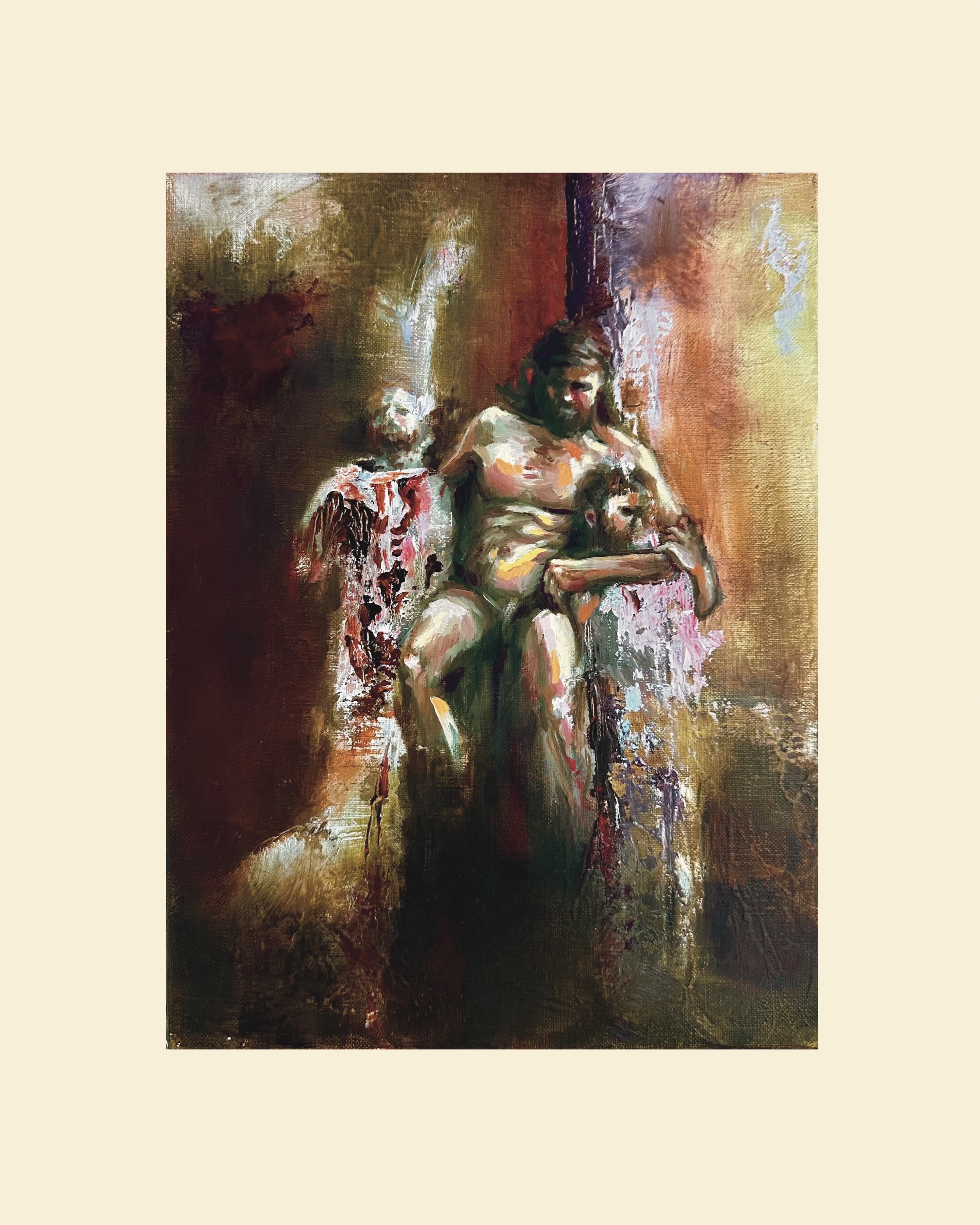
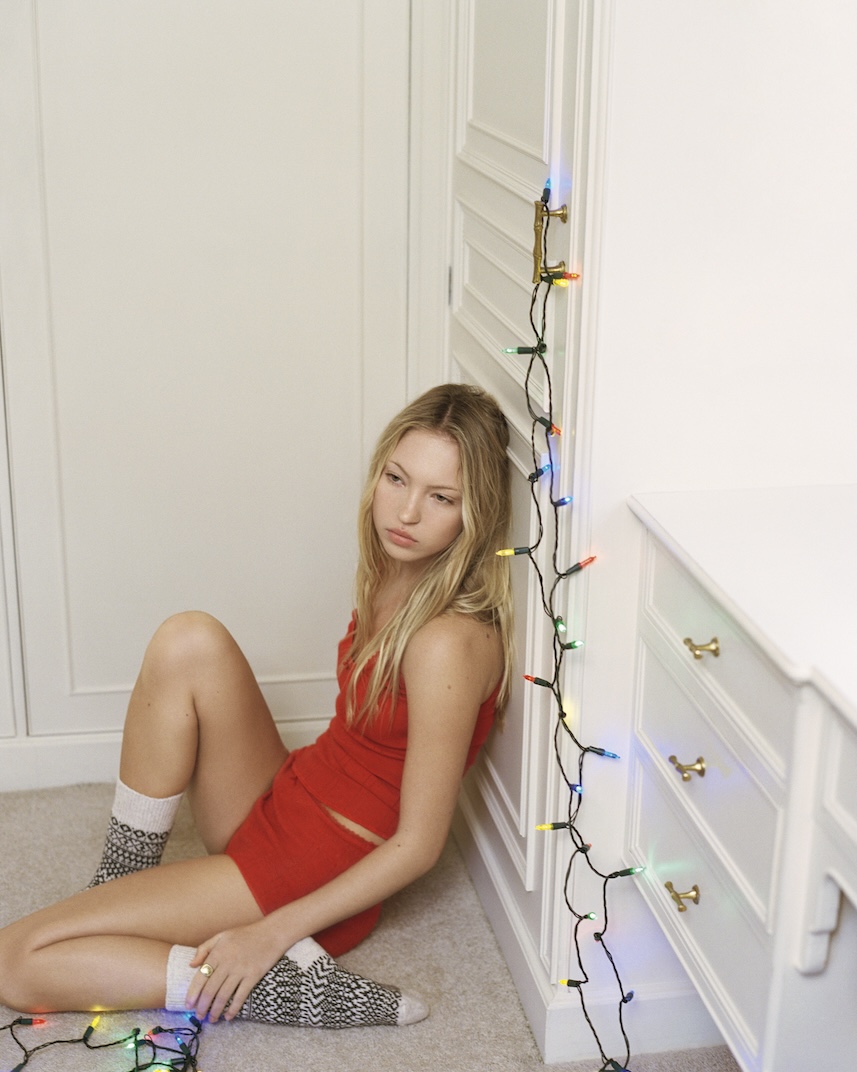
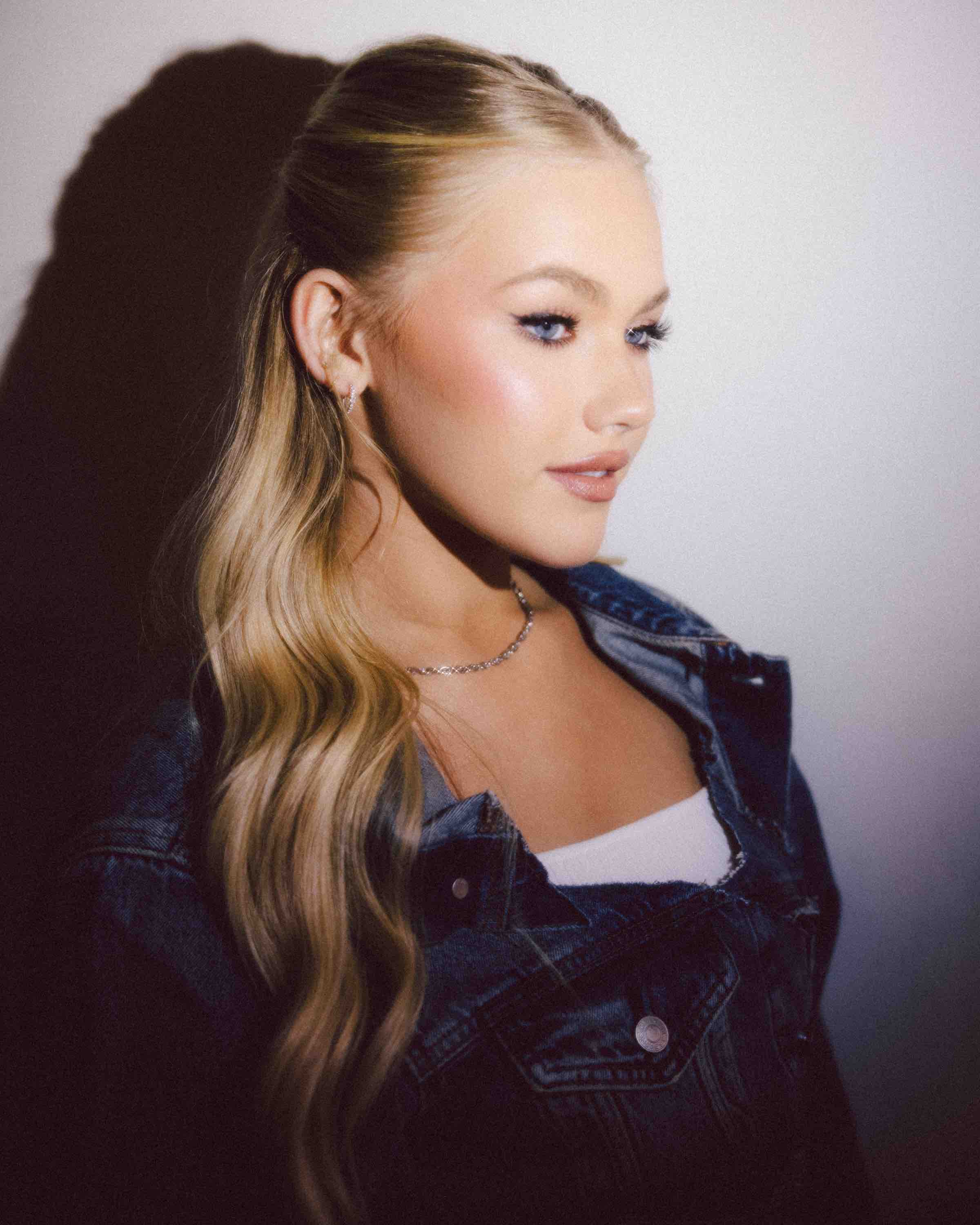
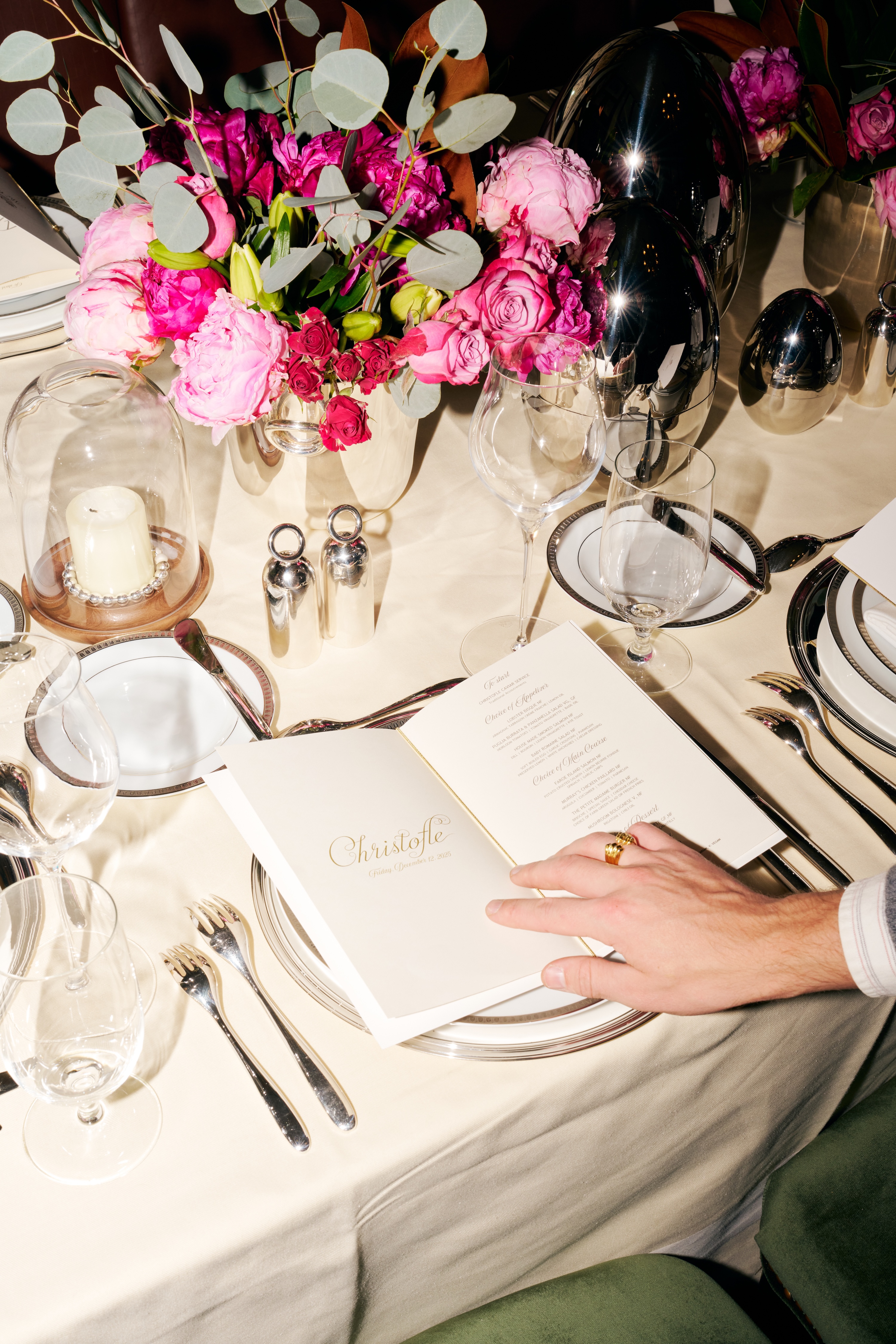
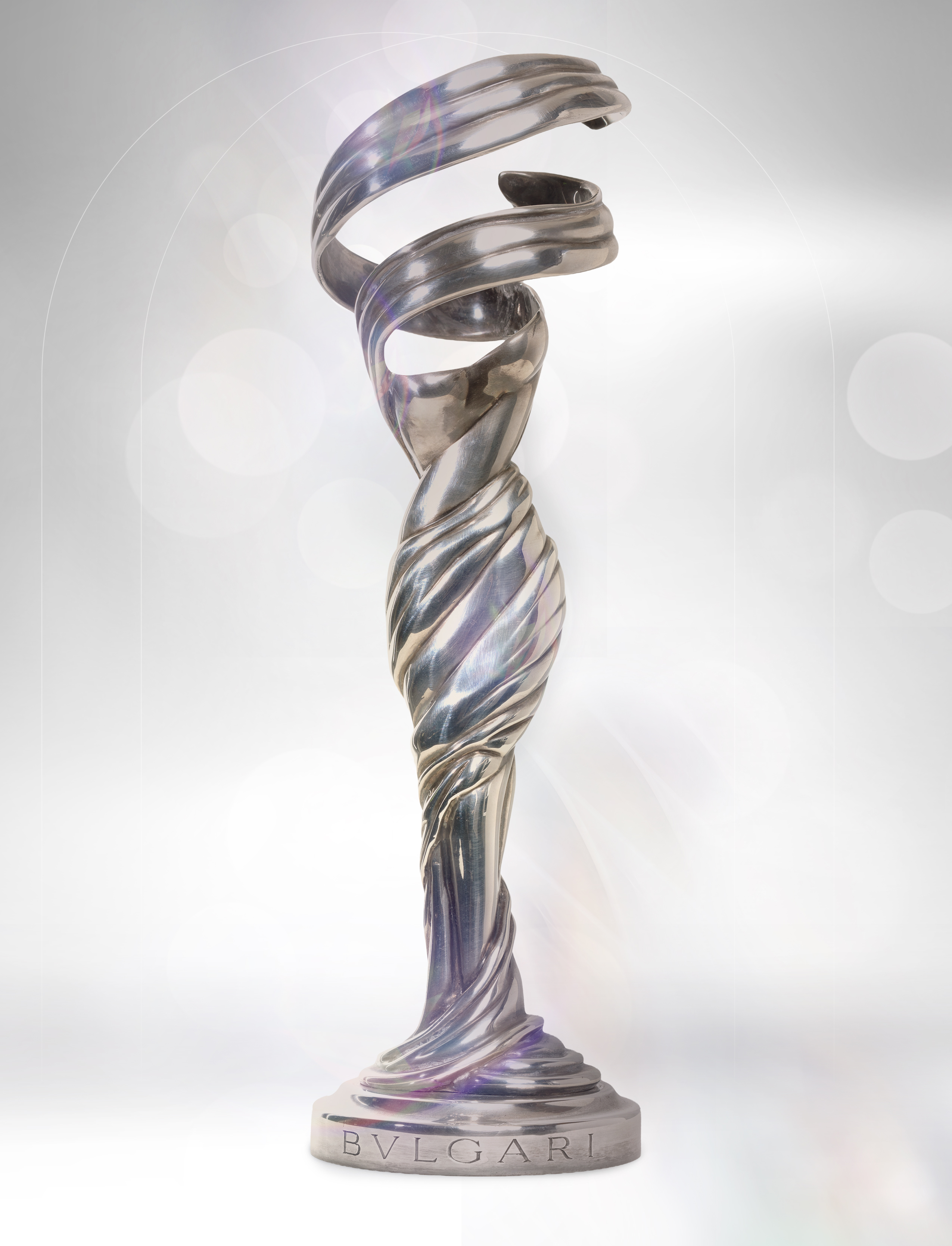
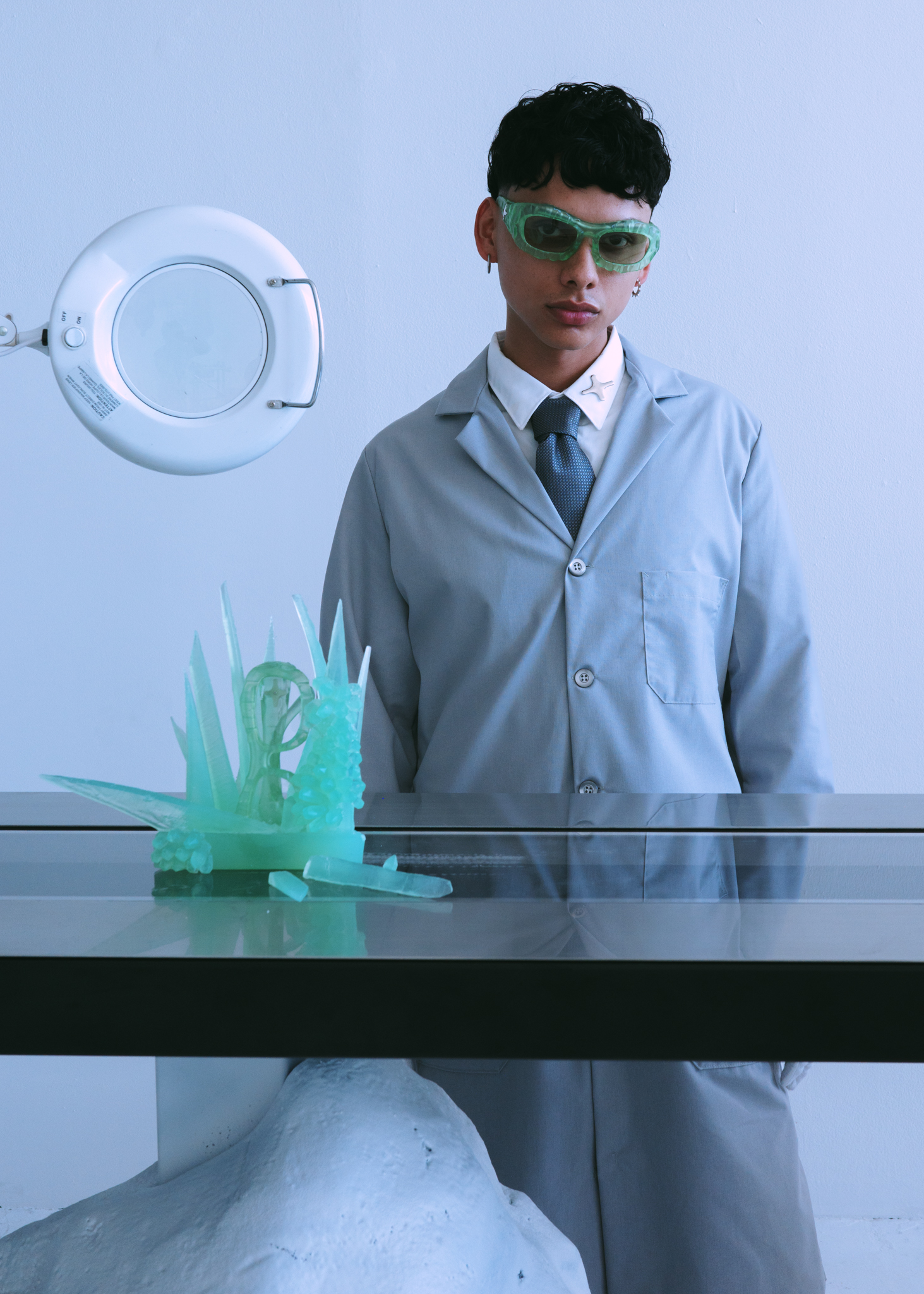
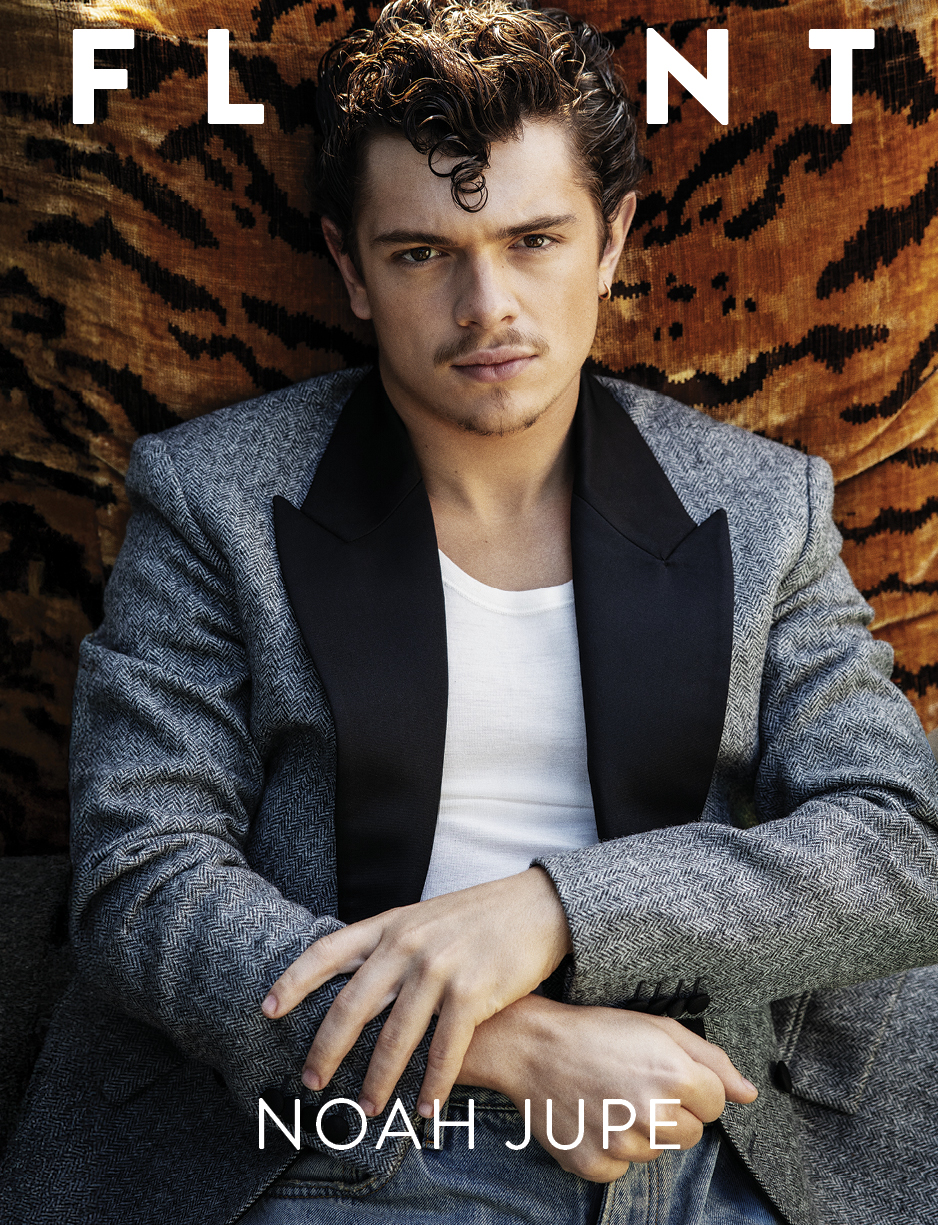
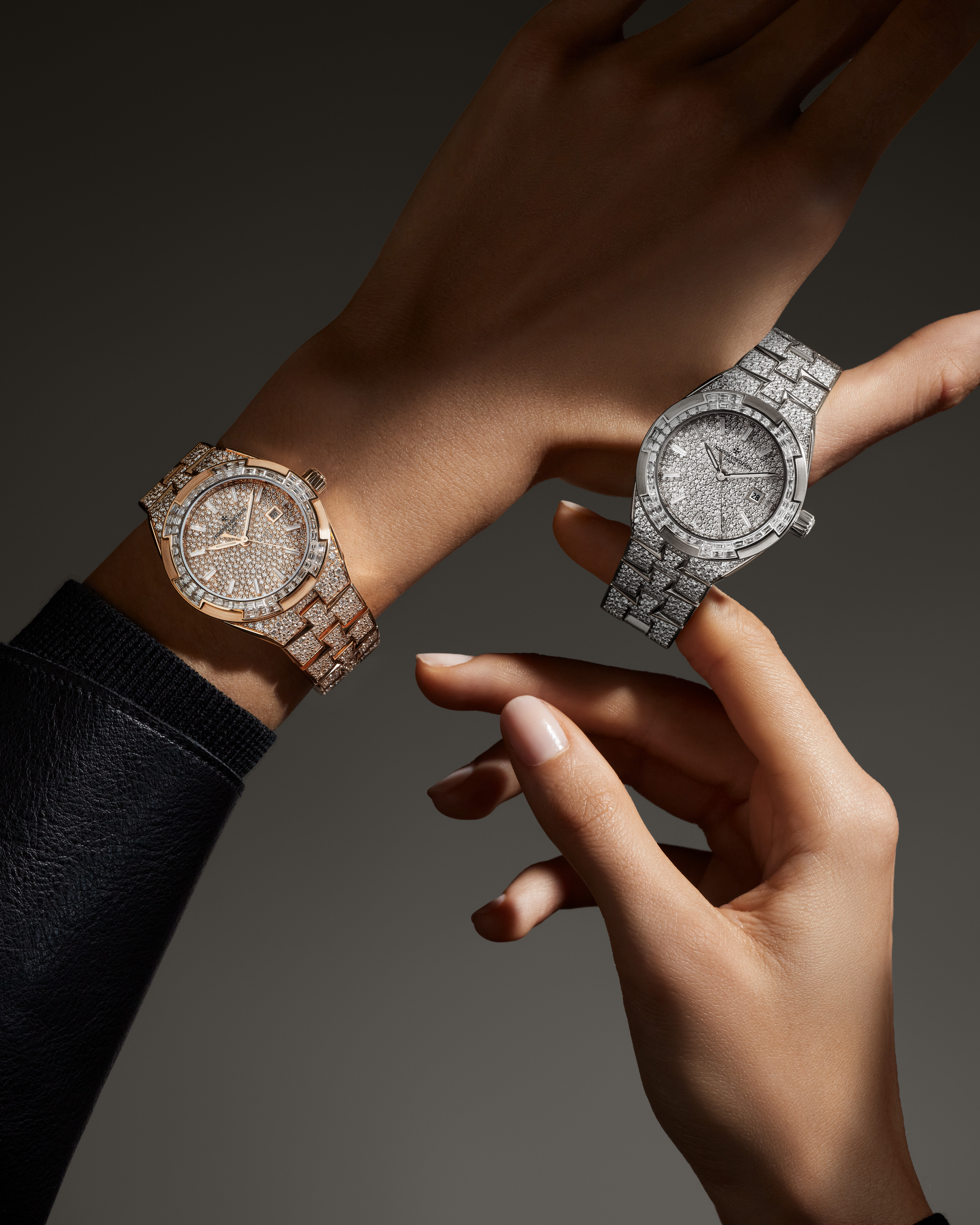
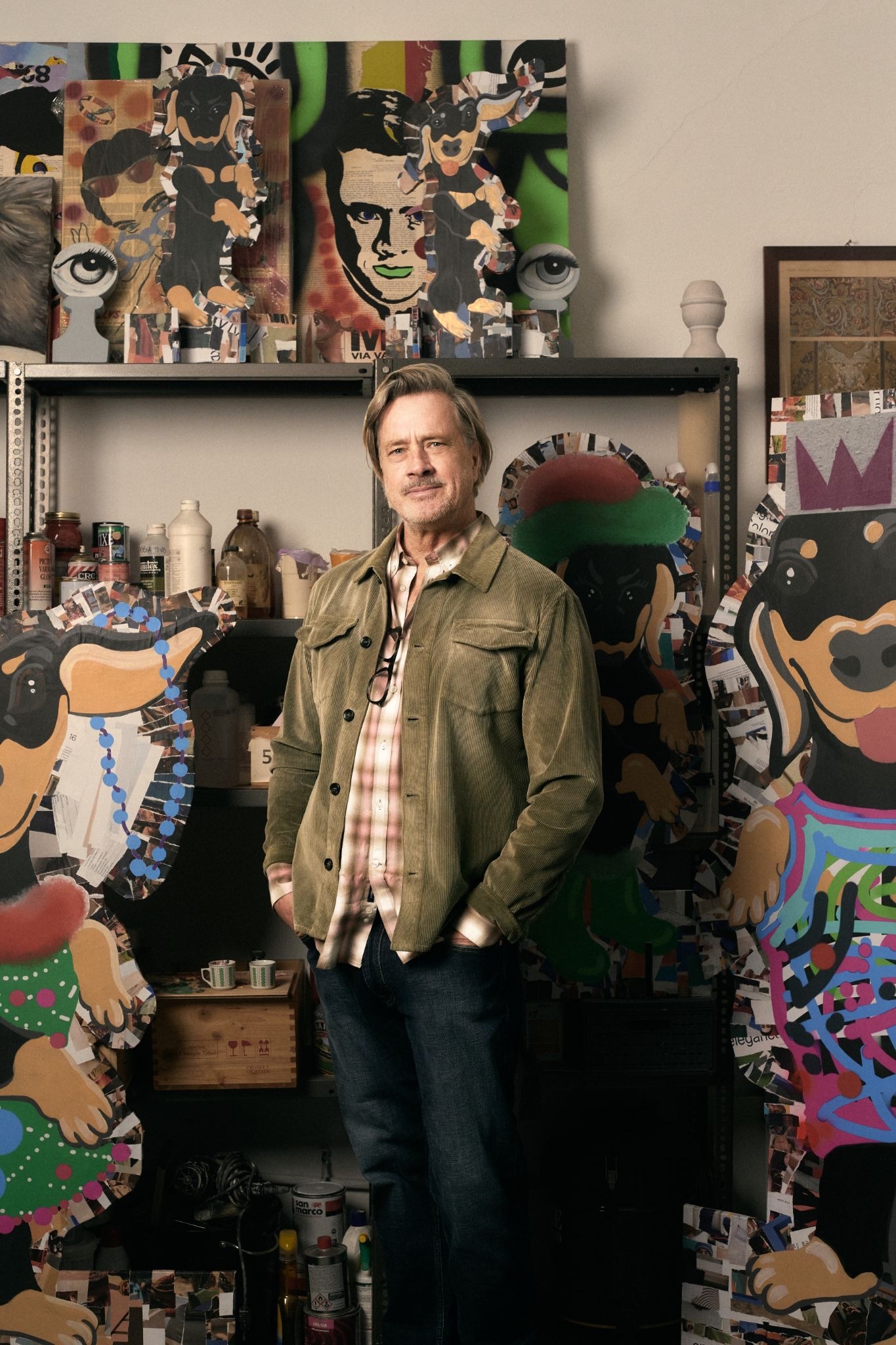
.JPG)
.jpg)
